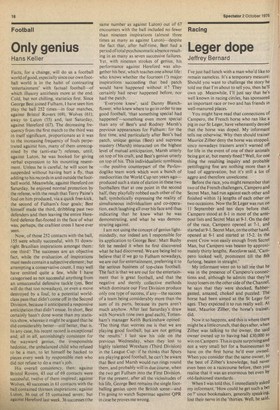Football
Only genius
Hans Keller
Facts, for a change, will do us a football world of good, especially since our own football world is in the habit of contrasting 'entertainment' with factual football--of which illusory antithesis more at the end.
Cold, but not chilling, statistics first. Since George Best joined Fulham, I have seen him play the ball 252 times—in four matches, against Bristol Rovers (69), Wolves (61), away to Luton (55) and, last Saturday, against Hereford (67). The decreasing frequency from the first match to the third was in itself significant, proportionate as it was to the increasing frequency of fouls perpetrated against him, many of them unrecognised by the (anti-star?) referees, until, against Luton, he was booked for giving verbal expression to his mounting resentment. Unless he is careful, he will soon be suspended without having hurt a fly, thus adding to his records in and outside the football world. Meanwhile, against Hereford on Saturday. he enjoyed normal protection by the referee, with the result that Terry Paine's foul on him produced, via a quick free-kick, the second of Fulham's four goals; Best himself made the third, dribbling past two defenders and then leaving the entire Hereford defence flat-footed in the face of what was, perhaps, the craftiest cross I have ever seen.
Now, of those 252 contacts with the ball, 155 were wholly successful, with 51 downright Brazilian inspirations amongst them: one third! The successes are an objective fact, while the evaluation of inspirations must needs contain a subjective element ; but attempting a conservative count, I may well have omitted quite a few, while I have categorised as not successful anything from an unsuccessful defensive tackle (yes, Best will do that too nowadays), or even a move destroyed by a foul, to a potential worldclass pass that didn't come off in the Second Division, because it anticipated a responsive anticipation that didn't ensue. In short, Best certainly hasn't done worse than my statistics show, whereas it might be argued that he did considerably better—still better, that is. In any case, his recent record is exceptional and, all in all, astonishingly consistent for the wayward genius, the irresponsible hedonist, the unbalanced child who refused to be a man, to let himself be hacked to pieces every week by responsible men who did not refuse to do a man's job.
His overall consistency, then: against Bristol Rovers, 43 out of 69 contacts were successful, twelve of them inspired; against Wolves, 40 successes in 61 contacts with the ball contained thirteen inspirations; against Luton, 36 out of 55 contained seven; but against Hereford last week, 36 successes (the same number as against Luton) out of 67 encounters with the ball included no fewer than nineteen inspirations (almost three times as many as against Luton)—despite the fact that, after half-time, Best had a period of total psychosomatic absence resulting in as many as seven successive failures. Yet, with nineteen strokes of genius, his performance against Hereford was altogether his best, which teaches one about life: who knows whether the fourteen ( !) major inspirations succeeding that bad patch would have happened without it ? They certainly had never happened before, nor had the patch.
'Everyone knew', said Danny Blanchflower, who knew where to go in order to see good football, 'that something special had happened'—something even more special than any of Best's and Rodney Marsh's previous appearances for Fulham: for the first time, and particularly after Best's bad patch, unique genius (Best) and supreme mastery (Marsh) interacted on the highest level of mutual anticipation, Marsh utterly on top of his craft, and Best's genius utterly on top of his. This individualistic symbiosis —the positive counterpart of the Pavlovdoglike team work which won a bunch of mediocrities the World Cup ten years ago— produced such a state of elation in these two footballers that at one point in the second half, they playfully robbed each other of the ball, symbolically expressing the reality of simultaneous individualism and co-operation, each laughing all over his face and thus indicating that he knew what he was demonstrating, and what he was demonstrating against.
I am not using the concept of genius lightmindedly, nor indeed am I responsible for its application to George Best : Matt Busby felt he needed it when he first discovered what he had discovered. We are being led to believe that if we go to Fulham nowadays, we are out for entertainment, preferring it to the serious business of top-class football. The fact is that we are out for the entertainment that is great football, and that the negative and sternly collective methods which dominate our First Division produce only one type of success, if any—the success of a team being considerably more than the sum of its parts, because its parts aren't much anyhow. After last Saturday's draw with Norwich (one own goal each), Tottenham's manager Keith Burkinshaw opined: 'The thing that worries me is that we are playing good football, but are not getting the results.' I last saw his side on the previous Wednesday, when they lost to highly talented Wrexham (Third Division) ;n the League Cup: if he thinks that Spurs are playing good football, he can't be aware that Best and Marsh would run rings round them, and probably will in due Course, when the two get Fulham into the First Division. For the present, after all the vicissitudes of his life, George Best remains the single footballing genius upon the British scene--and I'm going to watch Supermac against QPR in case he proves me wrong.


































 Previous page
Previous page